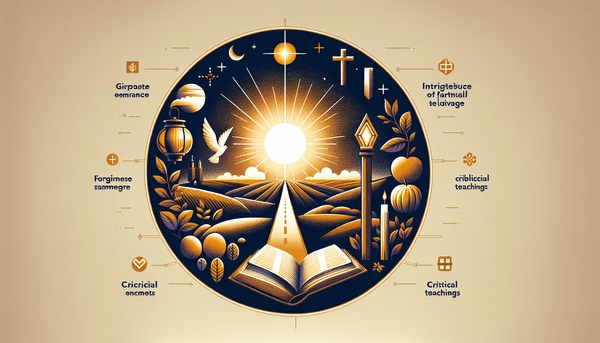The Role of Jewelry and Outward Adornment
When contemplating the role of jewelry and outward adornment in Christian life, we reflect on the biblical emphasis on humility and simplicity. The apostle Peter encourages women to focus on inner beauty rather than elaborate hairstyles and the wearing of gold jewelry or fine clothes (1 Peter 3:3-4). This sentiment echoes Jesus Christ's own lifestyle, which was marked by humility and a rejection of materialism, as He taught the value of spiritual wealth over earthly possessions (Matthew 6:19-21). Paul also urges believers to dress modestly, suggesting that godliness with contentment is itself great wealth (1 Timothy 2:9-10). In embodying these teachings, Christians are called to adopt a heart of service and simplicity, following the example set by Jesus (Philippians 2:5-8).
The Significance of the Dead Sea in Scripture
The Dead Sea holds a unique place in biblical history and symbolism. In the Old Testament, it is referred to as the 'Salt Sea' and is associated with the infamous cities of Sodom and Gomorrah, which faced divine judgment due to their wickedness (Genesis 14:3; Genesis 19:24-25). The prophet Ezekiel, however, speaks of a time when the Dead Sea's waters will be healed and life will flourish once more (Ezekiel 47:8-9). This transformation from a place of desolation to one of restoration offers a powerful metaphor for spiritual renewal and hope. It serves as a reminder of God's ability to bring life from death, a theme that resonates throughout the Scriptures.
The Incarnation of Jesus Christ
The Incarnation of Jesus Christ stands at the heart of Christian theology as a testament to God's profound love and involvement in human history. The prophetic words of Isaiah foretold the birth of Jesus to a virgin, a sign of the coming Messiah (Isaiah 7:14), which was later affirmed in the Gospel of Matthew (Matthew 1:22-23). The significance of the Incarnation is further revealed in the New Testament, as the author of Hebrews speaks to Jesus sharing in humanity to become a merciful and faithful high priest (Hebrews 2:14-18). Additionally, the apostle John poetically describes the Word becoming flesh and dwelling among us (John 1:14), highlighting the mystery and magnificence of God becoming man. Within this divine narrative, Mary's role as the mother of Jesus is characterized by her humility and obedient faith, as she accepts her calling with the words, 'I am the Lord's servant' (Luke 1:38).
FAQ
Q: Can women be preachers?
A: The Bible does not prohibit women from preaching. While some point to 1 Timothy 2:11-12 as a restriction, others cite examples of female leaders such as Deborah and Priscilla to support the inclusion of women in preaching roles.
Q: Why can’t Jesus wear jewelry?
A: The Bible does not explicitly say that Jesus cannot wear jewelry. However, it emphasizes humility and simplicity, as reflected in 1 Peter 3:3-4, suggesting that spiritual qualities are to be valued over external adornments.
Q: Can women be prophets?
A: Yes, the Bible records instances of women serving as prophets, such as Deborah in the Old Testament and Anna in the New Testament, who prophesied about Jesus at the temple.
Q: What does the Bible say about the Dead Sea?
A: The Dead Sea is mentioned in the Bible as the Salt Sea and the location of Sodom and Gomorrah. It also features in prophetic visions, such as in Ezekiel 47:8-9, which speak of its waters being healed and supporting life.






